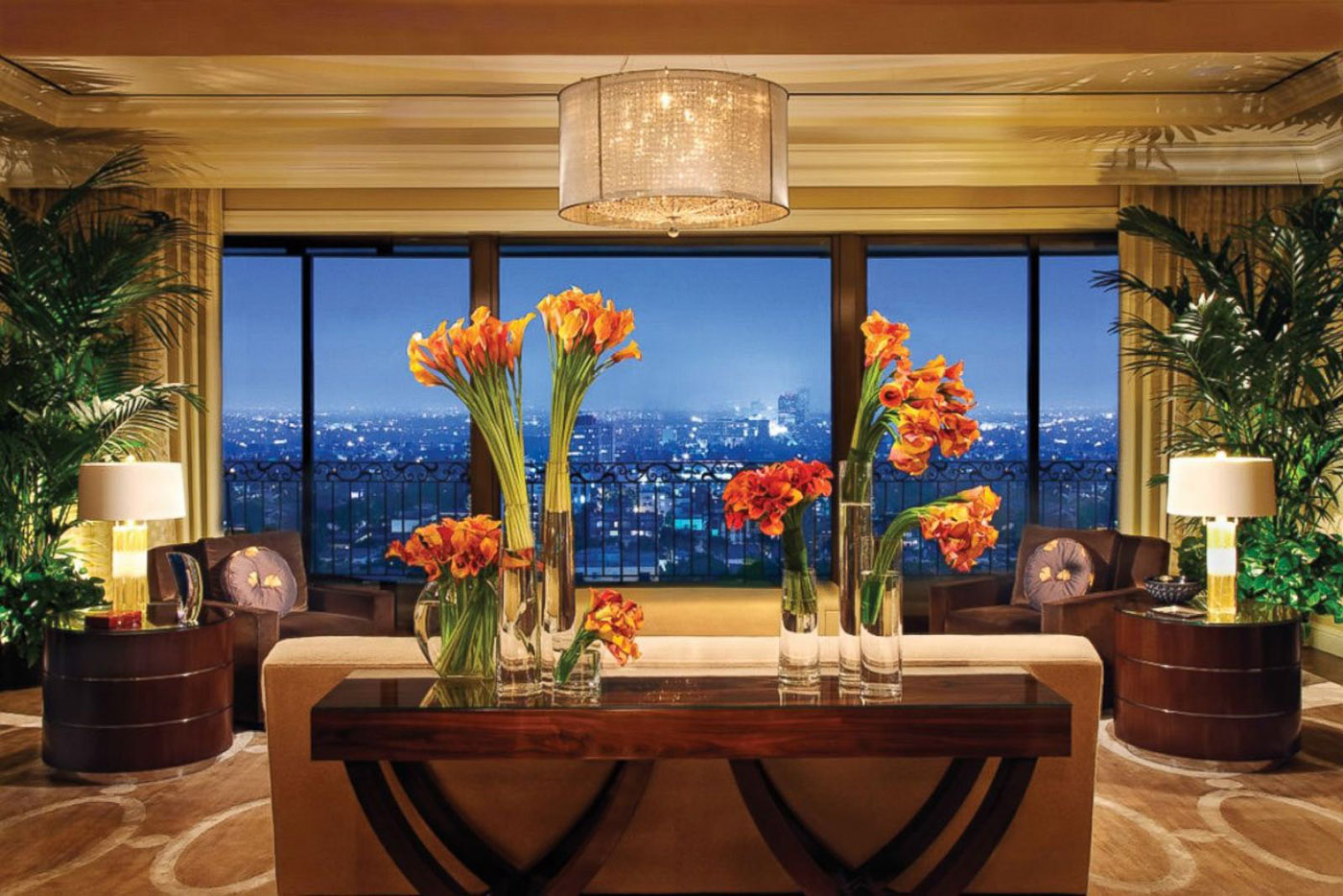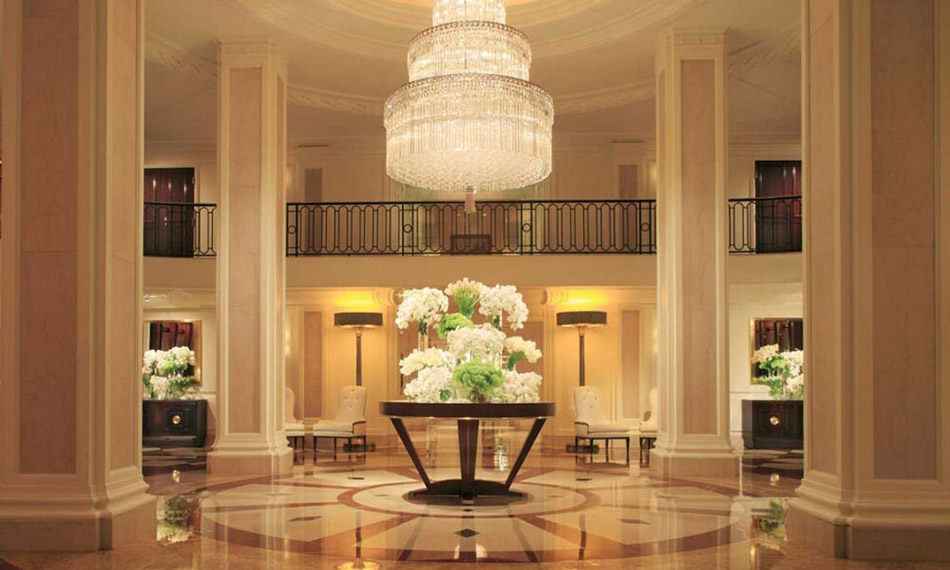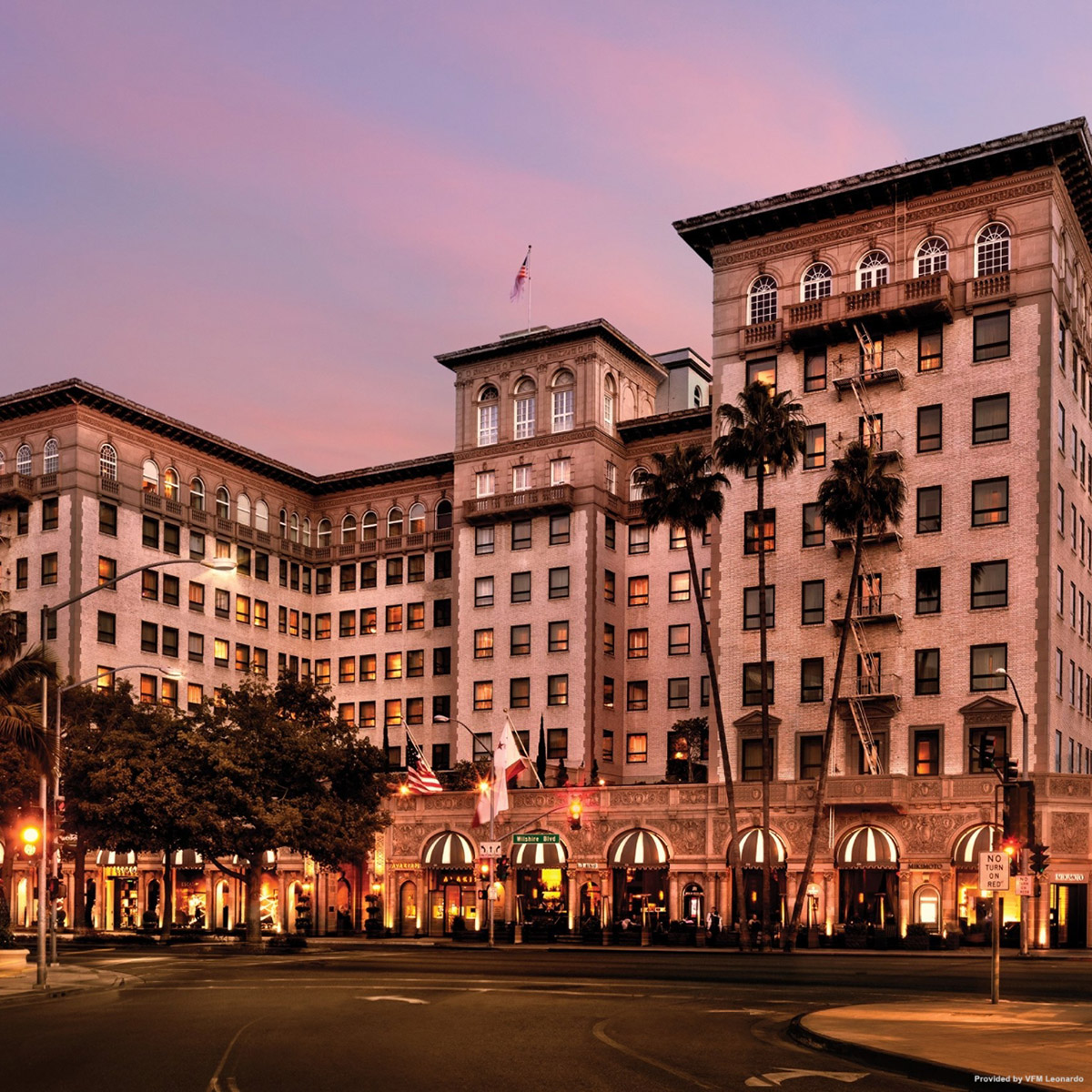
Noreen Moustafa
“Welcome to the show!”
That is how one of the front office managers would greet me at the start of my shift when I worked at the Beverly Wilshire Hotel, in Los Angeles. Like a director on a film set yelling “action,” he snapped me into character. As a concierge at one of the most iconic hotels in the world, I knew I was there to play a role in someone’s fantasy. With the swing of a door, I’d pass from the sterile white employees area, into a gold adorned elevator bank, what they call the “front of the house.” Lit by a 720-pound crystal chandelier, the hallowed and historical marble lobby was the stage, and I was on set. I even had a costume. A dark gray blazer with a matching skirt, sheer black pantyhose with a slight shimmer, and heels that walked the line between torture and comfort. Sensible yet sexy. Approachable yet professional. Rich but not too rich to serve you.

My colleagues and I all wore the same uniform, though we were each allowed a bit of self-expression — our silk scarves (which we were allowed to knot in three sanctioned ways). Purchased down the road on Rodeo Dr., our brightly colored scarves were either Hermes or Ferragamo, and were hotel property. Just like the suit. Just like me for eight hours a day. I was an extension of the experience being bought and sold at quite a hefty price tag. And though just an accessory, the scarf helped elevate the product (me) to the level of the consumer (the guests). I suppose it made me relatable to them. A bit of luxe around my neck to let them know that we were in the same club and that they needn’t be shy about their frivolous requests. They didn’t know I was being paid $13 an hour or lived in a small apartment. I spoke their language and was well-versed in the LA Philharmonic’s program, high-end fashion, and had the most sought-after restaurants on speed dial. I could summon a Rolls Royce at a moment’s notice and had access to a fleet of helicopters and private jets while still making monthly payments on my Volkswagen. I could get last minute tickets to any sold-out show or sporting event — at a price of course. And the words “impossible” and “no” had been scrubbed from my vocabulary. It was there that I learned an important skill that would be invaluable in every job I’ve had since — to just make it happen. At this desk of dreams, a guest could ask me for anything and it was my mandate. Their wish was in fact, my desire.
I am often asked what were some of the more memorable requests I received as a concierge. Well, there was Mariah Carey who wanted to be massaged “till she fell asleep,” which meant calling three different masseuses to trade off until four in the morning. Or the lady who wanted her bathroom carpeted because she was always in heels but didn’t like the sound they made on the tile. (Actually, that was also Mariah Carey). And though I am not one to be starstruck, I must admit I found it thrilling when I helped choose new sunglasses for the musician, Prince. But there was one instance in particular where I felt I had been asked something so absurd that I didn’t even know where to start.
Sara, a Saudi princess who like most of her cohort spent her summers traveling to avoid the desert heat, had already been staying with us for over a month. She was ethereal, elegant, kind and delicate. She typically wore white and her long black hair was divine. When she approached the front desk, she seemed to float. And when she spoke, I always had to lean in a bit to hear her which made everything she said feel like a secret. Typically, she just needed help organizing transport or booking beauty appointments, but one morning, she had a more wistful look in her eye than usual. Perhaps because she knew her time with us was coming to an end.
“Sabah al khair, Sara. Did they send you your mint tea this morning?” I asked.
“Yes, habibti, everything is fine. But I was thinking, I stayed in this hotel in Madrid before coming here…it was the J.W. Marriott.”
“Yes, okay…” I said, reaching for my notepad while trying not to break eye contact, ready to jot down her request.
“It smelled so good. It was amazing – citrus, jasmine? I don’t know. I want my palace in Jeddah to smell like that.”
“Yes. Okay, of course. You want the smell? So, was this a soap or shampoo in the room?” I couldn’t let her leave without clarifying.
“No, no — the hotel. I want the smell of the hotel. Find me that scent.” She was already halfway to the front door when she turned back and said, “I’ll be back in a couple of hours.”

I looked down on my notepad for a clue on where to begin and saw only the words: Madrid, smell, and Marriott. One of the best parts of the job was the camaraderie between us colleagues and in stressful times, it felt like it was us against them. I turned to my fellow concierge who was just hanging up the phone and told her what the princess had asked for. She was a veteran. Deadpan, she said, “You know why they call this the hospitality industry, right?”
“No, why?” I impatiently asked, just wishing she would help me.
“Because it’s like working in a mental hospital. Sometimes you have to treat guests like confused patients who have wandered out of their rooms. She just needs to be delicately redirected back with a smile. ‘Yes, Sara, tell me more about what you smelled?’” she giggled.
We both laughed but she knew as well as I did that no wish could go unattended to and that I’d have to figure this out. Or at least really try to. But what was she talking about? How could I deliver the smell of a hotel? I figured the best place to start was to call my counterpart in Madrid — the JW Marriott’s concierge. To my surprise, he knew exactly what I was talking about and passed me on to their marketing department. And from there, I began to pull at a thread that eventually led me to exactly what I was looking for.
Turns out J.W. Marriott had a contract with a scent marketing company — an industry of which I was wholly unaware. I learned that many retail stores, restaurants and hotels pump curated fragrances into the air to manipulate and trigger customers using the sense most tied to memory — olfactory. For example, a swimsuit store that smells like coconut tanning oil will subconsciously remind you of your last beach holiday, in order to inspire a purchase. And a gas station may pump the smell of fresh roasted java beans to push their not-so-fresh coffee. The company rep also said yes, Princess Sara’s home could smell like that hotel in Madrid for a few thousand dollars. He overnighted a popsicle stick dipped in the custom perfume for me to share with her. I couldn’t believe it — I had done it. She was delighted and ordered five commercial grade diffusers and a monthly subscription to the scent to outfit her palace. Although the money and the influence was not mine, I loved having the power to grant wishes and exceed people’s expectations. And that is what the luxury hotel business is actually about —selling an experience, not a bed.
The room rates at the Beverly Wilshire then started at $700 per night going all the way up to $18,000 per night for the almost perpetually booked Penthouse Suite. But at a certain point, no matter how beautifully decorated the rooms are or what zip code they are in, one had to ask themselves, what exactly is that customer paying for? What is it that they desire? And the answer to that question is the raison d’être of each of the over 600 employees working there, behind the scenes. Across several departments, each of them playing their part in the theater that is hospitality. This elaborate construct runs 24-hours a day, held up by each encounter a guest may have with staff. All of whom seem to magically know their name and answer their calls by asking “How can I help you?” And even after you’ve made your request, they’ll ask you to delve deeper with a compulsory ending, “Is there anything else I can assist you with?”
Our mission there was to cater to the whims, wants and needs of every guest, ideally before they were even articulated. Graciously and with pleasure, anticipating desires before they were even perceived. As a concierge, if I heard you cough or sniffle on the phone when requesting a dinner reservation, I would send up a cup of chamomile tea and some lozenges to your room before you left. I’d also ask the valet to pull your car up so that it was ready for you in the driveway when you came down. They would have cleaned your windshield overnight and set the temperature in the car just right as it idled in the porte-cochère. Maybe you would smile when you noticed that directions to the restaurant were already printed on the back of the confirmation letter placed on your front seat. But what would really baffle you is how the sommelier there knew you were celebrating your wedding anniversary and brought you the same bottle of wine you celebrated with last year…at a different restaurant, in another city completely. Courtesy of myself, the concierge who has been dutifully studying your guest profile since your arrival. “What’s her name again, the one in the orange scarf?” you’d wonder.
Each hotel guest has a profile in the system attached to their reservation that is updated by employees across the Four Seasons’ different properties. Beyond contact information, it contains details about an individual’s various preferences and dislikes. Something as banal as “Mrs. Smith is allergic to peanuts, likes her sheets untucked and prefers a room close to the elevator” to as salacious as “Don’t ask Mr. Barker why he is checking out after only one hour especially if he is staying with someone other than Mrs. Barker.” These personal profiles are what I believe make all the difference in creating this alternate reality that people are seeking when they choose to stay at a luxury property. A reality where their fancies are fawned over through manufactured familiarity.

In the morning meeting, a photocopied packet of headshots would be circulated amongst the different managers with the title, “Show Me You Know Me.” Pictured in these pages were all the VIPs and returning guests arriving that day and their names in all capital letters. They were then posted in all the back offices for the line staff to study. This plus the guest profile library fostered an atmosphere of recognition and friendliness in all the public areas of the hotel. Beyond the typical name usage one expects to receive at a hotel thanks to caller ID, a guest at the Beverly Wilshire could be greeted by name in an elevator, the hallway, or even laying out by the pool. The way people light up when called by their name with a smile is something that has stayed with me for a long time. It stands in stark contrast however, to the invisibility of the many employees who work in the “back of the house” at hotels, whose jobs are to remain unseen. I would think about what happened when these employees would cross paths with a guest.
Did it puncture the illusion to come back to your room and find a middle-aged, immigrant kneeling to fold the edge of your toilet paper into a crisp triangle? Even if she did it with great satisfaction and pleasure, I still found the constant prostration to the monied, disturbing. And eventually in myself, damaging. But this is a complicated feeling because I do believe that so many of the people who work in hospitality are genuinely kind, innately generous, and enjoy their jobs. As I did for a long time. And that even when operating from a script and careful training, their spirit of helpfulness and warmth is genuine. But the isolation of working in service positions where one is routinely not recognized, let alone called by name cannot be denied. Some examples of these jobs are a driver, a custodian, a housekeeper — any position where it is the societal norm to be ignored while working. Have you ever noticed how passengers can have a very personal conversation in the back of an Uber or taxi as if the driver isn’t even there? Or how throngs of students can pass a custodian in their school’s hallway for years without ever really seeing them?
But this invisibility is necessary in maintaining the mystery and magic of an impeccable stay at a luxury hotel. And the very structure of the property enforces this separateness through service elevators, hidden corridors, and pantries. Just like with any spectacle, perhaps it is best to ignore the man behind the curtain or in this case, the employees underground.
But “front of the house” employees such as myself had to straddle these two worlds and I eventually found them hard to reconcile. I sampled the finest restaurants in town so that my dining recommendations were informed by real experiences. But I never had to pay the bill. Instead, my meals were comped as the restaurants vied to win my favor and eventually my guests’ patronage. And time and time again, I found myself standing shoulder to shoulder with people who actually lived in a very different reality from me, whether it was at nightclubs or country clubs. I felt like an imposter because despite the illusion of equality, the superiority of the guest was always affirmed. I didn’t like the part of myself that became giddy when I was tipped big. Or how I became more doting to the guests who I knew were likely to give me cash in return. Even more distressing was the way my colleagues and I would compete for these certain guests’ attention.
After a large banquet or event in the ballroom, catering would sometimes send down the leftover food to the employee cafeteria. So instead of the usual (admittedly delicious) menu, sometimes we would get filet mignon and little soufflés topped with flakes of gold for dessert. At the beginning I saw this as an amazing perk, but eventually I felt resentful being served someone’s leftovers. In the locker room, housekeepers complained about their hours-long bus commutes into Beverly Hills while massaging their sore feet. One of the switchboard operators asked me what it was like to be one of the “beautiful people” allowed to work in the lobby. I’d never thought of it that way before and felt embarrassed.
Working in the lobby wasn’t always glamorous. It also meant being on the frontline of occasional aggression and unwanted advances. Once after recommending a bar to a guest, he asked if I would meet him there at the end of my shift. When I politely declined, he hushed his voice and said, “What if I told you I was a part of the Presidents’ Club?” I felt nervous that he wasn’t backing down and also had no idea what he was talking about. I knew about Amex’s Centurion club but what the hell was the Presidents’ Club? He clarified by pulling out his wallet and fanning cash out, showing off the presidents on the bills. I clumsily declined again, all the while careful not to lose my trained smile. He played it off as a joke, called me a flirt and sauntered away. You can imagine, I didn’t ask him if there was anything else I could assist him with like I was supposed to.
And so, over time, the problems of income inequality were brought into hyper-focus for me in this microcosm — this “show” as my manager called it. There is nothing wrong or immoral per say about seeking an alternate reality, a break, a holiday, an extravagance that makes us feel special. But what I realized was that all of us — from the guests to both the “visible” and “invisible” employees — we all actually wanted the same thing. And however this expressed itself, this universal desire for recognition is not frivolous at all. It is why a guest insisted I find a way for him to land his helicopter on Hearst Castle, not just next to it. It is why a certain bellman only delivered bags to a room when he was sure someone was there, so as not to miss a thank you. And why the dishwasher, soaked in suds and sweat, took great care to never break a single glass, hoping his boss would notice.
We all want the same thing. To be seen and to be heard. But how often we get that acknowledgement can depend on our position in the hierarchy. And only some of us can afford to buy that rapport, that respect, on demand. That “show me you know me,” touch.



